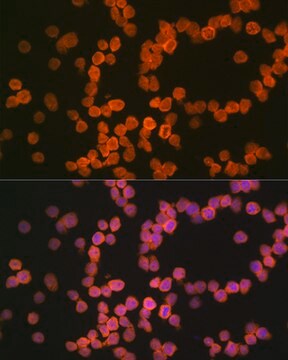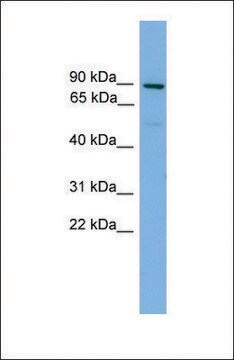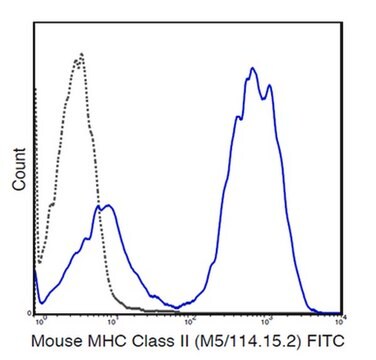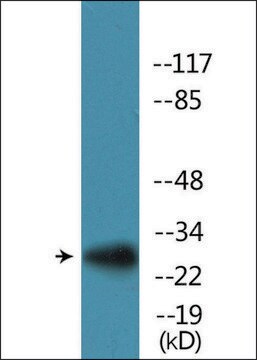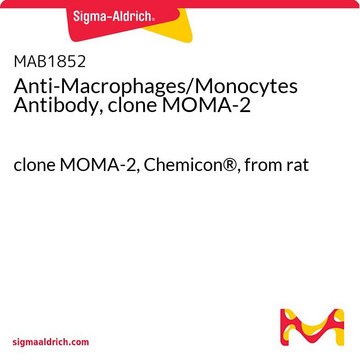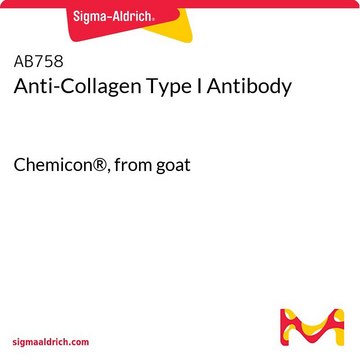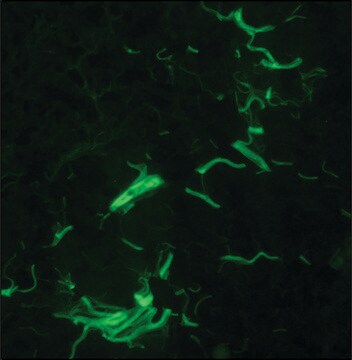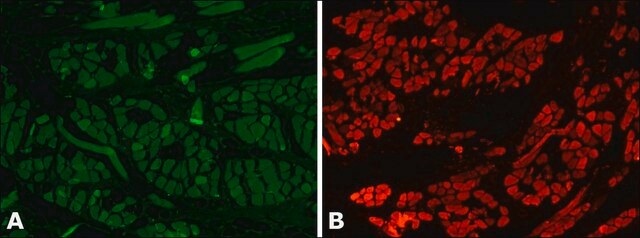SAB4700663
Monoclonal Anti-MHC Class II-FITC antibody produced in rat
clone M5/114, purified immunoglobulin, buffered aqueous solution
Synonim(y):
Szczurza monoklonalna anty-MHC klasy II - izotiocyjanian fluoresceiny
Zaloguj sięWyświetlanie cen organizacyjnych i kontraktowych
About This Item
Kod UNSPSC:
12352203
NACRES:
NA.41
Polecane produkty
pochodzenie biologiczne
rat
białko sprzężone
FITC conjugate
forma przeciwciała
purified immunoglobulin
rodzaj przeciwciała
primary antibodies
klon
M5/114, monoclonal
Formularz
buffered aqueous solution
reaktywność gatunkowa
mouse
stężenie
0.5 mg/mL
metody
flow cytometry: suitable
izotyp
IgG2b
Warunki transportu
wet ice
temp. przechowywania
2-8°C
docelowa modyfikacja potranslacyjna
unmodified
Powiązane kategorie
Opis ogólny
Major histocompatibility complex II (MHCII) is specifically localized on antigen presenting cells, such as macrophages, dendritic cells and B cells. MHC class II are classified in to two types classical and non- classical MHC class II molecules. In humans, there are three classical class II molecules HLA-DP, -DQ and –DR and two non-classical molecules, namely HLA-DM and –DO.
The rat monoclonal antibody M5/114 reacts with murine MHC class II glycoproteins. It recognizes a shared determinant on I-Ab, I-Ad, I-Aq, and I-Ed, I-Ek alloantigens, but it does not react with I-Af, I-Ak, I-As. This antibody can inhibit I-A-restricted T cell responses of the H-2b, H-2d, H-2q, H-2u but not H-2f, H-2k, H-2s haplotypes.
Immunogen
Activated C57BL/6 mouse spleen cells
Zastosowanie
The reagent is designed for Flow Cytometry analysis. Suggested working dilution is 4 μg/mL of sample. Indicated dilution is recommended starting point for use of this product. Working concentrations should be determined by the investigator.
Działania biochem./fizjol.
Major histocompatibility complex II (MHCII) plays a vital role in initiating immune response by presenting peptides derived from extracellular pathogens to T cells bearing the CD4 marker. Mutations in the gene increase the risk of susceptibility to autoimmune diseases such as diabetes mellitus, rheumatoid arthritis and pemphigus vulgaris.
Cechy i korzyści
Evaluate our antibodies with complete peace of mind. If the antibody does not perform in your application, we will issue a full credit or replacement antibody. Learn more.
Postać fizyczna
Solution in phosphate buffered saline, pH 7.4, with 15 mM sodium azide.
Oświadczenie o zrzeczeniu się odpowiedzialności
Unless otherwise stated in our catalog or other company documentation accompanying the product(s), our products are intended for research use only and are not to be used for any other purpose, which includes but is not limited to, unauthorized commercial uses, in vitro diagnostic uses, ex vivo or in vivo therapeutic uses or any type of consumption or application to humans or animals.
Ta strona może zawierać tekst przetłumaczony maszynowo.
Nie możesz znaleźć właściwego produktu?
Wypróbuj nasz Narzędzie selektora produktów.
Kod klasy składowania
10 - Combustible liquids
Temperatura zapłonu (°F)
Not applicable
Temperatura zapłonu (°C)
Not applicable
Wybierz jedną z najnowszych wersji:
Masz już ten produkt?
Dokumenty związane z niedawno zakupionymi produktami zostały zamieszczone w Bibliotece dokumentów.
Li Dong et al.
Journal of inflammation research, 14, 2471-2482 (2021-06-19)
Parkinson's disease is a common neurodegenerative disease in the elderly. The incidence of various cancers in Parkinson's disease patients is significantly lower than in healthy people. Parkinson's disease patients are individuals with a high tendency for inflammation, whose peripheral immune
REGULATION OF MHC CLASS II GENES: Lessons from a Disease
Mach B, et al.
Annual Review of Immunology, 1996, 301-331 (1996)
Genetic Control of MHC Class II Expression
Ting JP and Trowsdale J
Cell, 109, S21-S33 (2002)
A molecular basis for MHC class II--associated autoimmunity
Todd JA, et al.
Science, 240, 1003-1009 (1988)
Yoshihiro Kuwano et al.
International immunology, 19(8), 977-992 (2007-09-07)
CD83 is a member of the Ig superfamily expressed primarily by mature dendritic cells (DCs). In mice, CD83 expression by thymic stromal cells regulates CD4(+) T cell development, with CD83(-/-) mice demonstrating dramatic reductions in both thymus and peripheral CD4(+)
Nasz zespół naukowców ma doświadczenie we wszystkich obszarach badań, w tym w naukach przyrodniczych, materiałoznawstwie, syntezie chemicznej, chromatografii, analityce i wielu innych dziedzinach.
Skontaktuj się z zespołem ds. pomocy technicznej
